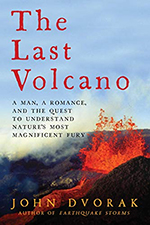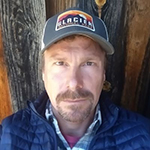24 December 2022
The Last Volcano, by John Dvorak
Posted by Callan Bentley
 A new week, a new nonfiction geology book by John Dvorak! This one is a biography of Thomas Jaggar, who founded the Hawaiian Volcano Observatory. It was a really interesting portrait of a man driven to spend time with erupting mountains. The book begins with the eruption of Mt. Pelee in Martinique, a harrowing pyroclastic flow that kills almost everyone in St. Pierre. The son of a bishop, young Jaggar realizes there are potentially huge benefits to monitoring volcanoes for signs of eruption. Lives could be saved through the application of geophysical science at these discrete sites around the world. He journeys to Vesuvius, Yellowstone, Japan, and Alaska, but ultimately finds his purpose at Kilauea, on the big island of Hawaii. Jaggar’s big idea is that we won’t know what’s going on with a volcano unless we establish a baseline dataset, and that takes dedicated staff and equipment, and that takes (government) funding. The HVO started with MIT, then became part of the Weather Bureau, then the National Park Service, and nowadays resides under the USGS. At the start, there was plenty of wheeling and dealing and networking in order to get the observatory established, and one of the unexpected insights of the book was a primer on the colonial history of Hawaii, particularly the substantial influence of Lorrin Thurston, a businessman and politico who seems to have been just as critical as Jaggar in getting the observatory established and maintained. (Thurston’s motivations were very different, though.) Through years and years of making daily observations, Jaggar determined that earthquake swarms presage eruptions, that there are long-term cycles of inflation and deflation of the volcano as magma moves through its system of reservoirs. He also made the first tsunami warning based on seismology, a practice that saves lives to this day. Dvorak devotes ample coverage to Jaggar’s family/romantic life, as well, in particular the synergy Jaggar found with his second wife, who became integrated into his scientific practice at Kilauea. All told, it made me impressed with how one person’s legacy can echo through the subsequent decades as a positive force. The USGS, in partnership with other institutions, now manages five volcano observatories in the United States, a fact that should comfort every citizen, including those looking for ways to trim the federal budget.
A new week, a new nonfiction geology book by John Dvorak! This one is a biography of Thomas Jaggar, who founded the Hawaiian Volcano Observatory. It was a really interesting portrait of a man driven to spend time with erupting mountains. The book begins with the eruption of Mt. Pelee in Martinique, a harrowing pyroclastic flow that kills almost everyone in St. Pierre. The son of a bishop, young Jaggar realizes there are potentially huge benefits to monitoring volcanoes for signs of eruption. Lives could be saved through the application of geophysical science at these discrete sites around the world. He journeys to Vesuvius, Yellowstone, Japan, and Alaska, but ultimately finds his purpose at Kilauea, on the big island of Hawaii. Jaggar’s big idea is that we won’t know what’s going on with a volcano unless we establish a baseline dataset, and that takes dedicated staff and equipment, and that takes (government) funding. The HVO started with MIT, then became part of the Weather Bureau, then the National Park Service, and nowadays resides under the USGS. At the start, there was plenty of wheeling and dealing and networking in order to get the observatory established, and one of the unexpected insights of the book was a primer on the colonial history of Hawaii, particularly the substantial influence of Lorrin Thurston, a businessman and politico who seems to have been just as critical as Jaggar in getting the observatory established and maintained. (Thurston’s motivations were very different, though.) Through years and years of making daily observations, Jaggar determined that earthquake swarms presage eruptions, that there are long-term cycles of inflation and deflation of the volcano as magma moves through its system of reservoirs. He also made the first tsunami warning based on seismology, a practice that saves lives to this day. Dvorak devotes ample coverage to Jaggar’s family/romantic life, as well, in particular the synergy Jaggar found with his second wife, who became integrated into his scientific practice at Kilauea. All told, it made me impressed with how one person’s legacy can echo through the subsequent decades as a positive force. The USGS, in partnership with other institutions, now manages five volcano observatories in the United States, a fact that should comfort every citizen, including those looking for ways to trim the federal budget.


 Callan Bentley is Associate Professor of Geology at Piedmont Virginia Community College in Charlottesville, Virginia. He is a Fellow of the Geological Society of America. For his work on this blog, the National Association of Geoscience Teachers recognized him with the James Shea Award. He has also won the Outstanding Faculty Award from the State Council on Higher Education in Virginia, and the Biggs Award for Excellence in Geoscience Teaching from the Geoscience Education Division of the Geological Society of America. In previous years, Callan served as a contributing editor at EARTH magazine, President of the Geological Society of Washington and President the Geo2YC division of NAGT.
Callan Bentley is Associate Professor of Geology at Piedmont Virginia Community College in Charlottesville, Virginia. He is a Fellow of the Geological Society of America. For his work on this blog, the National Association of Geoscience Teachers recognized him with the James Shea Award. He has also won the Outstanding Faculty Award from the State Council on Higher Education in Virginia, and the Biggs Award for Excellence in Geoscience Teaching from the Geoscience Education Division of the Geological Society of America. In previous years, Callan served as a contributing editor at EARTH magazine, President of the Geological Society of Washington and President the Geo2YC division of NAGT.
I loved this book and would like to re-read it. Fun to read your review!